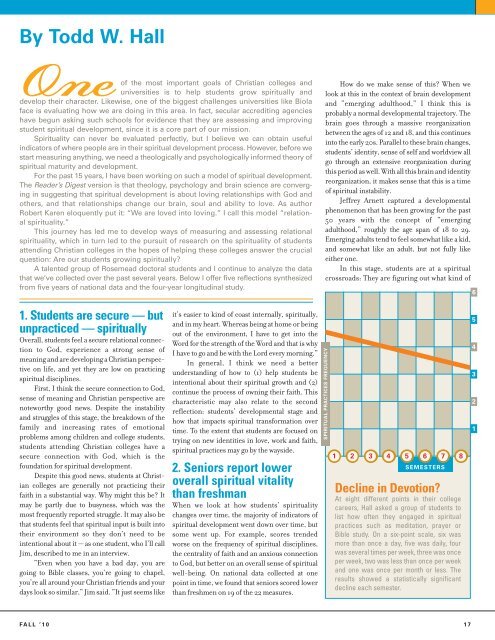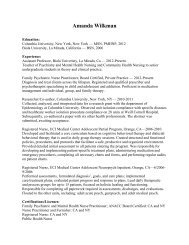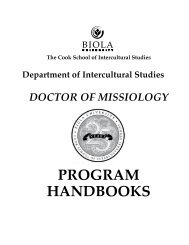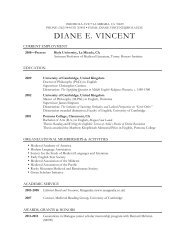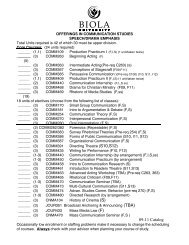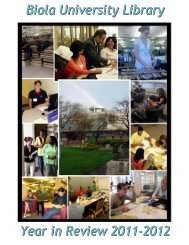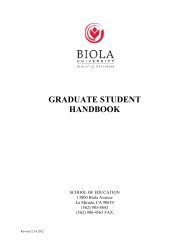Create successful ePaper yourself
Turn your PDF publications into a flip-book with our unique Google optimized e-Paper software.
By Todd W. Hall<br />
Oneof<br />
the most important goals of Christian colleges and<br />
univer sities is to help students grow spiritually and<br />
develop their character. Likewise, one of the biggest challenges universities like <strong>Biola</strong><br />
face is evaluating how we are doing in this area. In fact, secular accrediting agencies<br />
have begun asking such schools for evidence that they are assessing and improving<br />
student spiritual development, since it is a core part of our mission.<br />
Spirituality can never be evaluated perfectly, but I believe we can obtain useful<br />
indicators of where people are in their spiritual development process. However, before we<br />
start measuring anything, we need a theologically and psychologically informed theory of<br />
spiritual maturity and development.<br />
For the past 15 years, I have been working on such a model of spiritual development.<br />
The Reader’s Digest version is that theology, psychology and brain science are converg -<br />
ing in suggesting that spiritual development is about loving relationships with God and<br />
others, and that relationships change our brain, soul and ability to love. As author<br />
Robert Karen eloquently put it: “We are loved into loving.” I call this model “rela tion -<br />
al spirituality.”<br />
This journey has led me to develop ways of measuring and assessing relational<br />
spirituality, which in turn led to the pursuit of research on the spirituality of students<br />
attending Christian colleges in the hopes of helping these colleges answer the crucial<br />
question: Are our students growing spiritually?<br />
A talented group of Rosemead doctoral students and I continue to analyze the data<br />
that we’ve collected over the past several years. Below I offer five reflections synthesized<br />
from five years of national data and the four-year longitudinal study.<br />
1. Students are secure — but<br />
unpracticed — spiritually<br />
Overall, students feel a secure relational con nec -<br />
tion to God, experience a strong sense of<br />
mean ing and are developing a Christian per spec -<br />
tive on life, and yet they are low on practicing<br />
spiritual disciplines.<br />
First, I think the secure connection to God,<br />
sense of meaning and Christian perspective are<br />
noteworthy good news. Despite the instability<br />
and struggles of this stage, the breakdown of the<br />
family and increasing rates of emotional<br />
problems among children and college students,<br />
students attending Christian colleges have a<br />
secure connection with God, which is the<br />
foundation for spiritual development.<br />
Despite this good news, students at Christ -<br />
ian colleges are generally not practicing their<br />
faith in a substantial way. Why might this be? It<br />
may be partly due to busyness, which was the<br />
most frequently reported struggle. It may also be<br />
that students feel that spiritual input is built into<br />
their environment so they don’t need to be<br />
intentional about it — as one student, who I’ll call<br />
Jim, described to me in an interview.<br />
“Even when you have a bad day, you are<br />
going to Bible classes, you’re going to chapel,<br />
you’re all around your Christian friends and your<br />
days look so similar,” Jim said. “It just seems like<br />
it’s easier to kind of coast internally, spiritually,<br />
and in my heart. Whereas being at home or being<br />
out of the environment, I have to get into the<br />
Word for the strength of the Word and that is why<br />
I have to go and be with the Lord every morning.”<br />
In general, I think we need a better<br />
understanding of how to (1) help students be<br />
intentional about their spiritual growth and (2)<br />
continue the process of owning their faith. This<br />
characteristic may also relate to the second<br />
reflection: students’ developmental stage and<br />
how that impacts spiritual transformation over<br />
time. To the extent that students are focused on<br />
trying on new identities in love, work and faith,<br />
spiritual practices may go by the wayside.<br />
2. Seniors report lower<br />
overall spiritual vitality<br />
than freshman<br />
When we look at how students’ spirituality<br />
changes over time, the majority of indicators of<br />
spiritual development went down over time, but<br />
some went up. For example, scores trended<br />
worse on the frequency of spiritual disciplines,<br />
the centrality of faith and an anxious connection<br />
to God, but better on an overall sense of spiritual<br />
well-being. On national data collected at one<br />
point in time, we found that seniors scored lower<br />
than freshmen on 19 of the 22 measures.<br />
How do we make sense of this? When we<br />
look at this in the context of brain development<br />
and “emerging adulthood,” I think this is<br />
probably a normal developmental trajectory. The<br />
brain goes through a massive reorganization<br />
between the ages of 12 and 18, and this continues<br />
into the early 20s. Parallel to these brain changes,<br />
students’ identity, sense of self and worldview all<br />
go through an extensive reorganization during<br />
this period as well. With all this brain and identity<br />
reorganization, it makes sense that this is a time<br />
of spiritual instability.<br />
Jeffrey Arnett captured a developmental<br />
phenomenon that has been growing for the past<br />
50 years with the concept of “emerging<br />
adulthood,” roughly the age span of 18 to 29.<br />
Emerging adults tend to feel somewhat like a kid,<br />
and somewhat like an adult, but not fully like<br />
either one.<br />
In this stage, students are at a spiritual<br />
crossroads: They are figuring out what kind of<br />
1 2 3 4 5 6 7 8<br />
SEMESTERS<br />
Decline in Devotion?<br />
At eight different points in their college<br />
careers, Hall asked a group of students to<br />
list how often they engaged in spiritual<br />
practices such as meditation, prayer or<br />
Bible study. On a six-point scale, six was<br />
more than once a day, five was daily, four<br />
was several times per week, three was once<br />
per week, two was less than once per week<br />
and one was once per month or less. The<br />
results showed a statistically significant<br />
decline each semester.<br />
F A L L ’ 1 0 1 7<br />
SPIRITUAL PRACTICES FREQUENCY<br />
6<br />
5<br />
4<br />
3<br />
2<br />
1


